The plotline behind Pride@Prejudice has a lot of potential. Or rather, each of its seven plotlines does.
Under Laura W. Andruski’s direction, the Rockville Little Theatre has put on Daniel Elihu Kramer’s play Pride@Prejudice, which is trying to combine seven — count ’em — takes on Jane Austen’s novel Pride and Prejudice into one show. It’s 1) a staging of Austen’s original text, 2) teenagers commenting on the experience of reading Austen’s texts, phones in hand, still in costume as the Austen characters, 3) “teacher” characters narrating the show with plot summaries and “study questions” — literally introduced by a character saying “study questions! number one” — 4) meta-jokes about the plot from narrator characters, 5) meta-jokes about the film and TV adaptations of Pride and Prejudice, 5) a Monty Python-esque take in which the original characters joke and comment, in character, about their respective narrative lots, 6) letters to Jane Austen, and 7) commentary from Austen herself.
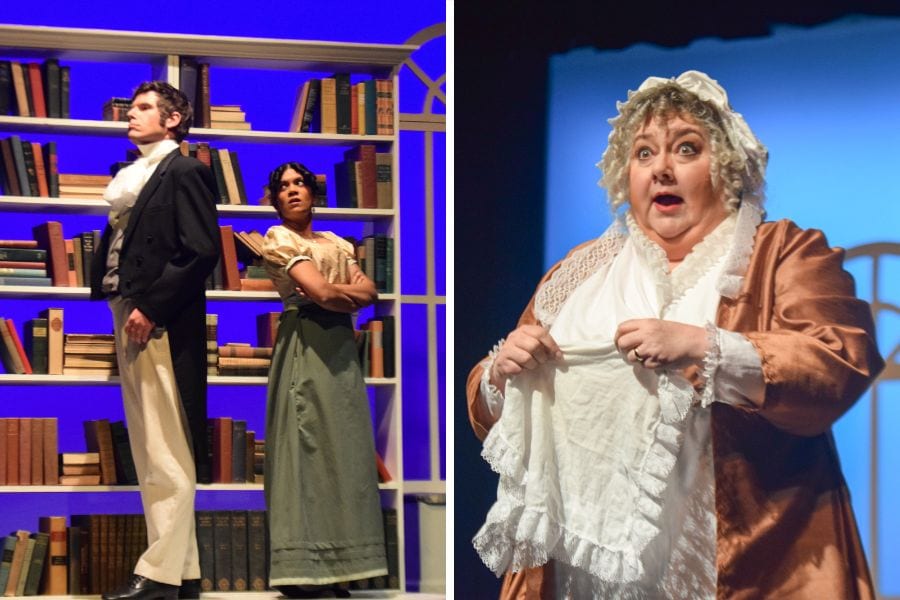
The script has tried to force all seven of these plotlines into one show, and the final product is deeply confusing. This show simply doesn’t have a cohesive narrative, other than its attempt to limp through Austen’s original storyline. Two or even three of these plotlines could have been combined successfully, but with major editing and honing of how they are executed: I’m afraid that someone who was playing Mr. Darcy a second ago switching character into a teenager via a lighting change and whining “This book is so confusing!” isn’t particularly subtle or smart.
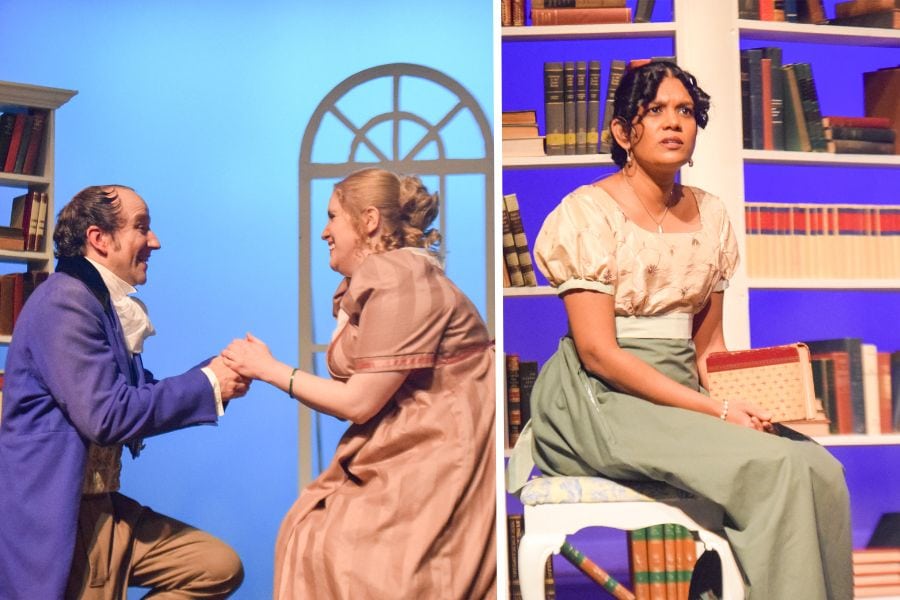
The official synopsis says that in the show, “modern-day characters literally step off the page to blog, google, and tweet.” Yes, the show does feel like Twitter: the play’s characters comment as they feel without much concern for how their interjections connect to the broader conversation. The plot summary on the Rockville Little Theatre website describes this as a “romantic deconstruction.” That’s a promising premise, but it’s unclear whether the medium of the stage is the right one for a literary deconstruction — especially if one hopes to make an entertaining night out at the theater out of it.
This production does deserve credit where credit is due. The actors’ period accents, under the direction of Dialect Coach Pauline Griller-Mitchell, are deeply impressive, and better yet, their ability to switch seamlessly between their Windsor accents and American voices is worthy of praise. The success of the actors’ English accents is essential to the show, and they actually do pull them off with excellence.
Joseph Coracle is a truly remarkable comic actor, both with his verbal delivery and physical comedy; he is responsible for 75% of the show’s successful jokes and executes them with a twinkle in his eye. When Darcy proposes to Elizabeth and Coracle’s “narrator” sprints across the stage advertising a mug that says “My feelings will not be repressed, you must allow me to tell you how ardently I admire and love you,” I had to let myself hope that this was a joke smart enough to know it was making fun of the often nonsensical, degrading commercialism around classic literature. Everything else in the show, which seems so allied with the perspective of unquestioning fandom and one-dimensional “jokes,” seems to suggest that’s the wrong interpretation, but Coracle’s promotion of that mug is so hilariously wild and Carrey-esque that I can let myself believe. Coracle is equally funny when the characters are playing teenagers confused by the text and he gallops onto the stage with a massive banner in tow with a huge graphic organizer explaining the characters’ intertwining relationships. His performance is the best part of this show.
Pride@Prejudice is at its best when the characters are simply acting out Austen’s text, and when Coracle has center stage. Meghan Williams Elkins is also an ideal casting choice for Mrs. Bennet, and puts full energy into delivering her lines in that role and her student/narrator roles. Niranjali Amerasinghe’s and Ian Swank’s performances as Elizabeth Bennet and Mr. Darcy also raise an important question: They did a solid job portraying the stiff introversion of early-1800s Britain — such a solid job that I wondered if a narrative that spends so much time depicting and mocking this rigidity is really meant for the stage, when unlike in a film, the audience cannot see precise, understated changes in facial expression. Perhaps this could have been compensated for in other aspects of their performances, like more pauses and expression — rubato would be the word for that — in the manner of line delivery.
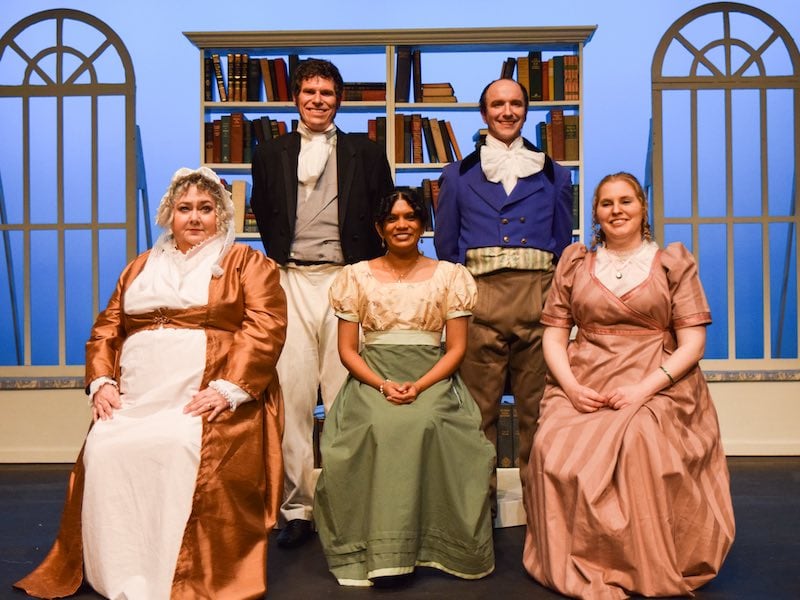
Jennifer Georgia’s period costume work is excellent, and the set design and props work of Bill Pressly, Harlene Leahy, and William Kolodrubetz are immersive, with multiple book-filled shelves around the stage. These stage pieces are lovingly accented with Stephen Deming’s colorful light design and Andrew Harasty’s lighting execution. I do wonder, given the number of moments involving a piano, why there wasn’t a piano or even a portable keyboard on stage that would have prevented the actors from having to mime out piano playing in the air while piano music played.
On the whole, these actors and crew put their whole hearts into a script not worthy of their talents. I am excited to see what they produce in coming seasons.
Running Time: Approximately two and a half hours, with one 15-minute intermission.
Pride@Prejudice plays February 3, 4, and 5, 2023, presented by Rockville Little Theatre performing at the F. Scott Fitzgerald Theatre, 603 Edmonston Dr, Rockville, MD. Friday and Saturday shows take place at 8 PM, and Sunday shows take place at 2 PM. Purchase tickets ($22; $20 students and seniors) online.
The Pride&Prejudice program is online here.
COVID Safety: Masks optional.


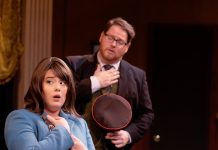
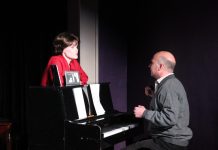

What a elitist stuffy review. The performance i attended was full of laughter and was very well received. The reviwer might wish to put out a search party for their sense of humor. Commenting on the lack of a keyboard onstage says more about the state of mind of the reviewer than it does about the play.
The performance i attended was full of laughter and was very well received. The reviwer might wish to put out a search party for their sense of humor. Commenting on the lack of a keyboard onstage says more about the state of mind of the reviewer than it does about the play.